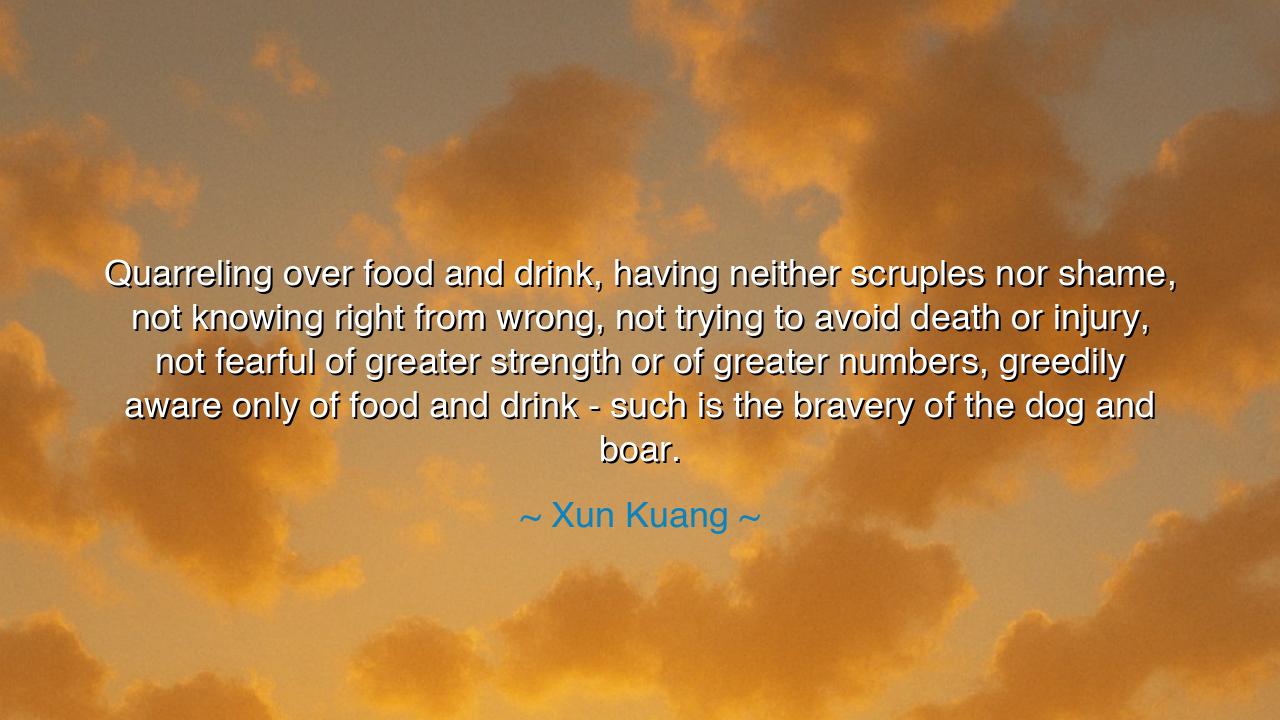
Quarreling over food and drink, having neither scruples nor
Quarreling over food and drink, having neither scruples nor shame, not knowing right from wrong, not trying to avoid death or injury, not fearful of greater strength or of greater numbers, greedily aware only of food and drink - such is the bravery of the dog and boar.






Hear the stern and timeless words of the sage Xun Kuang, known as Xunzi, who declared: “Quarreling over food and drink, having neither scruples nor shame, not knowing right from wrong, not trying to avoid death or injury, not fearful of greater strength or of greater numbers, greedily aware only of food and drink – such is the bravery of the dog and boar.” In this saying he does not praise, but rebukes. He strips away the mask of false courage, showing that what many call bravery is, in truth, only the blind impulse of beasts. To fight without cause, to rush heedlessly without wisdom, to think of nothing but appetite—this is not the way of man, but the path of the animal.
The origin of these words lies in the Warring States period of ancient China, a time of chaos and endless battles, when many equated reckless fighting with valor. Xunzi, disciple of Confucian tradition yet tempered by his own severe realism, warned against confusing wild ferocity with true courage. He saw that human beings, unlike dogs and boars, must be guided by scruples, shame, and moral judgment. Bravery without wisdom, he taught, is not virtue but savagery. It leads not to honor but to destruction, for it is strength unleashed without purpose or restraint.
History offers us vivid mirrors of this teaching. Consider the fall of the Spartan king Cleomenes, who, intoxicated with the hunger for battle, rushed into wars without foresight or prudence. Though none doubted his daring, his reckless actions brought not glory but ruin upon himself and his city. His was the bravery of the boar—blind to the greater strength of enemies, driven by appetite for power, heedless of consequence. Compare this to Leonidas at Thermopylae, who knew the strength of the Persian host yet chose sacrifice with clarity of purpose. One shows reckless ferocity; the other, true courage born of reason and honor.
The heart of Xunzi’s wisdom is that true bravery is guided by virtue. To be unafraid of death is meaningless if one does not know what is worth dying for. To resist greater numbers is hollow if one does so only for food or selfish gain. Courage without righteousness is but another form of greed. The beasts fight over scraps and glory in their ignorance; man, if he would be more than beast, must anchor his strength in justice and his will in moral purpose.
There is also here a teaching about self-mastery. The dog and the boar are ruled by appetite and impulse, slaves to hunger and anger. But the noble person learns to master his own desires, to distinguish right from wrong, to measure risk against the weight of the cause. Such a one does not leap into danger carelessly, but enters it with eyes open, heart steady, and purpose clear. For this reason, Xunzi teaches that wisdom transforms strength into true courage, while ignorance reduces it to mere brutality.
Consider also the story of George Washington at Monmouth. In the heat of the Revolutionary War, when his men faltered in disarray, he did not rush wildly into the fray like a beast. Instead, he rallied his soldiers with discipline, turned confusion into order, and led with calm strength. His bravery was not in reckless charges, but in the measured application of courage bound to purpose. Thus, he endured where others would have perished.
The lesson for us is clear: do not mistake recklessness for valor. Do not glorify the blind fight over petty things, whether in life, work, or conflict. Instead, cultivate courage that is tied to justice, honor, and wisdom. Before you act, ask: Is this cause worthy? Am I led by virtue, or by appetite? Will my courage uplift, or will it drag me into the mud with beasts? True bravery is not in the noise of ferocity, but in the quiet strength of purpose.
Thus, O seeker, remember Xunzi’s words: the bravery of the dog and the boar is no bravery at all, but the impulse of appetite. Aspire instead to the courage of the sage and the noble warrior—strength guided by wisdom, ferocity tempered by righteousness, daring anchored in justice. For only then does courage rise above beastly impulse and become the virtue that shapes civilizations and ennobles the soul.






AAdministratorAdministrator
Welcome, honored guests. Please leave a comment, we will respond soon